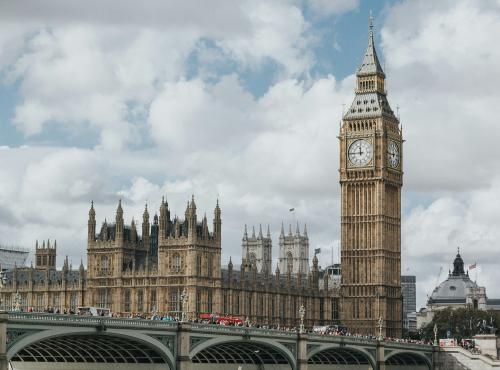How can Parliament make health and care safer for all?
At a time of incredible challenge and rapid change within the health and social care system, is regulation doing all it can to keep people safe?
In a new report by the Professional Standards Authority, Safer care for all – solutions from professional regulation and beyond, we ask whether there is more that professional regulation can do to help address some of the key unresolved challenges for patient and service user safety in 2022 and beyond.
We also consider some of the gaps in the wider framework to protect the public, including within current legislation, and consider where Parliament and the Government have an opportunity to act to support safer care for all.
The report covers four key themes:
- Tackling inequalities
- Keeping pace with changes to the funding and delivery of care
- Facing up to the workforce crisis
- Accountability, fear and public safety
We suggest solutions to a number of problems across all these themes, as well as one major overarching recommendation: that each UK nation should have a Health and Social Care Safety Commissioner. This new Commissioners would have broad responsibility for identifying, monitoring and advising on ways to address risks to patients and service users.
The report covers a lot of ground – both an executive summary and the full report are available here. Below, we describe how the recommendations of the report may be part of the answer to the major issues facing this Parliament.
Tackling inequalities in health and care professional regulation
As acknowledged by MPs in the Health Inequalities: Office for Health Improvement and Disparities debate this year, inequalities across the health and social care system are stark. To take just one example that we highlight in our report, it is shocking that black women are four times more likely than white women to die in childbirth in the UK. To tackle these inequalities requires coordinated action across the Government, Parliament and the health and social care sector.
We are calling for major improvements in the data that is captured about health and social care complainants. Currently this information is not routinely gathered across the UK. Regulators and other bodies in the sector should use complaints information to better understand and tackle the barriers to patients and service users accessing safe care.
We are aware that the regulatory process can exacerbate existing inequalities for professionals. The General Medical Council (GMC) commissioned research into the fitness to practise process shows that black and minority ethnic registrants are twice as likely to be referred to the GMC by employers compared to white doctors, and that international medical graduates are more likely to be subject to more serious sanctions through the regulatory process.
This is not an easy problem to address, as the causes are complex, but more can and must be done. We want regulators to ensure that people who sit on fitness to practise panels and who make decisions about whether professionals should be sanctioned for poor practice or behaviour are drawn from a diverse pool. We are also calling for regulators to expect more of professionals in tackling discriminatory behaviour.
Keeping pace with changes in how care is delivered and funded
Developments in health and care are currently outpacing legislation. A growing proportion of care in the UK is being delivered by the private sector, as well as online. Technological advances mean robotics and AI are increasingly used to diagnose and treat conditions, presenting both opportunities and risks to patient care.
In 2021, this Parliament passed the Botulinum Toxin and Cosmetic Fillers (Children) Act. The scope of the law applies to all – from regulated healthcare professionals to individuals performing the cosmetic procedures on an informal basis – and ensures the protection of people under-18 is prioritised above commercial interests. As the services of commercial and ‘high street’ providers are increasingly relied upon, Parliament needs to ensure regulators have the agility to address new risks that arise from this evolution, rather than their having to wait for changes to their legislation. This includes maximising the benefits of the ongoing work by Government to reform the powers of the healthcare professional regulators.
In Safer Care for All we explore some of these new and emerging risks, including individual conflicts of interest, online care provision, new technologies, and concerns that some healthcare business models could prioritise profit over the best interests of patients and staff. We draw on examples of where harm has occurred, such as the (thankfully rare) cases where doctors have made inappropriate referrals for financial gain, to make recommendations for how the system could be improved.
We are calling, among other things, for a cross-sector review of the effectiveness of arrangements to address financial conflicts of interest among healthcare professionals. We also want regulators to do more to tackle business practices that fail to put patients first. We also believe that the sector needs a more proactive, coordinated approach to identifying future risks and ways of addressing them.
Facing up to the workforce crisis
The scale of the health and care workforce shortages in the UK is widely acknowledged, but worth repeating: we may need over a million extra workers in the next decade. Safer Care for All considers how we can use regulation differently so that it is seen as a tool for workforce expansion, rather than a brake on it.
Could regulated professionals be trained faster? Should we think differently about standards and role definition to bring more people into the workforce? Just asking these questions is a marked change from our previous stance – that regulation should not be drawn into workforce issues. We now believe that the risks posed by the lack of staff is so severe that a new approach is required. This means regulators, educators and professional bodies exploring whether there are opportunities for accelerating training safely. We also recommend that better and smarter use is made of unregulated roles and alternative models of regulation.
More broadly, we need a coherent, government-led approach to the regulation of people in the health and care sectors, to support workforce planning – a strategy for the regulation of health and care workers. The four UK Governments should work collaboratively to develop a coherent framework that will support delivery of national health and social care workforce strategies.
Accountability, fear, and public safety
Does individual accountability have to be at odds with learning cultures on the health and social care frontlines? Our report considers the value of both to safe care, and calls for a debate on how they can coexist.
Professional regulation has a role to play – it could do more to explain its fitness to practice decisions where these relate to mistakes, and to bust myths and misconceptions that exacerbate the fear of the regulator felt by registrants.
But there is a development at the national level that appears to work against the coexistence of accountability, transparency, and learning. The Health and Care Act 2022 will establish the Health Services Safety Investigations Body (HSSIB) in April 2023 as the successor body to the England-only Healthcare Safety Investigation Branch. HSSIB’s safety investigations will have legal privilege, also often referred to as ‘safe spaces’. This will mean that information within investigations will be confidential and will only be divulged under very specific circumstances.
We are calling on the Government to take steps to ensure that ‘safe spaces’ do not undermine existing systems that keep people safe in health and care, and allow victims and family get the truth when care has gone wrong, such as systems for individual accountability and the duty of candour. We suggest this should take the form of a review looking at whether the benefits of ‘safe spaces’ outweigh any negative impacts on pre-existing mechanisms.
We have also committed to starting a conversation with interested groups, to find ways for the ‘safe spaces’ approach, and other initiatives for improving safety culture, to support candour and accountability.
The way forward
While there have been many improvements in health and care regulation over the last two decades, the health and social care safety landscape is fragmented and complex, and structural flaws in the framework remain.
The Paterson, Cumberlege and Ockendon reports describe a fragmented system, with patient safety concerns falling through the gaps and the patient voice being lost. Many Parliamentarians will have constituents who have given emotional testimonies to these inquiries, or who will do so in the ongoing COVID-19 public inquiry. It is vital that the recommendations of inquiries have impact, and that implementation of their recommendations is monitored.
For these reasons, and to address the problems outlined in Safer care for all, we are calling for the creation of a Health and Social Care Safety Commissioner role for each UK country. The Commissioners would have steely and unblinking focus on safety across the system, and the influence to bring about change.
They would help to identify current, emerging, and potential risks across the whole health and social care system and bring about the necessary action across organisations. They would also coordinate public inquiries and reviews, and monitor how recommendations are implemented.
For England this could build on the Patient Safety Commissioner role, recently introduced following recommendations from the Cumberlege Review, but whose remit will be limited to medicines and medical devices.
We would welcome the opportunity to work with members of the All-Party Health Group to take forward actions to promote safer care for all.
Authored by the Professional Standards Authority
About the Professional Standards Authority
For 20 years the Professional Standards Authority has worked to protect patients, service users and the public by improving the regulation and registration of health and social care professionals. Parliament established the Authority, through the NHS Reform and Health Care Professions Act 2002 to protect the public amongst the complex landscape of health and care regulation.



